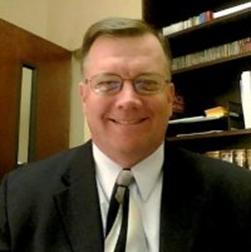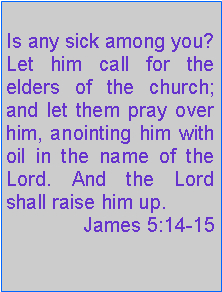

|
Anyone who reads the New Testament can readily conclude that divine physical healing was a normal part of the ministry of Jesus. After Jesus' ascension it is also easily seen that the apostles actively were participants in events where divine physical healing took place. This writer will leave it up to the readers to find all the references of these marvelous moments for them-selves.
In the over 40 years as a minister of the gospel I have never heard anyone dispute the fact that the New Testament gives us example after example of divine physical healing. Some may reject them as fable or a scribe’s effort to make Jesus and the apostles appear to be more than they really were, but they still admit that the New Testament provides numerous accounts of divine physical healing.
There are many who maintain that divine physical healing ended after the death of the apostles. They quote 1 Cor. 13: 8-10, “Love never faileth: but whether there be prophecies, they shall be done away; whether there be tongues, they shall cease; whether there
be knowledge, it shall be done away. For we know in part, and we prophesy in part; but when that which is perfect is come, that which is in part shall be done away” (ASV). For whatever reason, they make application of this area of scripture to the matter of divine physical healing. It seems to me that our brothers and sisters who ascribe to this viewpoint have failed to grasp the reality of the New Testament realization of divine physical healing.
Let us consider a couple things in particular. First, it would appear to be without dispute that Jesus did give healing to people, but that there was one time at His home town of Nazareth when He did not. Matt. 13:53-58, “And it came to pass, that when Jesus had finished these parables, He departed thence. And when He was come into His own country, He taught them in their synagogue, insomuch that they were astonished, and said, Whence hath this man this wisdom, and these mighty works? Is not this the carpenter's son? is not His mother called Mary? and His brethren, James, and Joses, and Simon, and Judas? And His sisters, are they not all with us? Whence then hath this man all these things? And they were offended in Him. But Jesus said unto them, A prophet is not without honour, save in his own country, and in his own house. And He did not many mighty works there because of their unbelief” (KJV). There is no other time in the New Testament that Jesus failed to give healing to those who came seeking. It would appear that faith has a primary role to play in divine physical healing.
While there are a couple of instances where the person that was healed was unable to come to Jesus on his or her own due to being incapacitated, yet in these cases the person who came to Jesus on behalf of the afflicted one had faith that Jesus would give healing. One such instance is the Centurion who sought out Jesus to heal his servant. When the Centurion told Jesus that he believed He could heal his servant without being there in person we hear the words of Jesus in Matt. 8:10, “Verily I say unto you, I have not found so great faith, no, not in Israel” (KJV).
It would also seem that most of the healing that Jesus provided was in the public arena. The woman who had an issue of blood was healed in a crowd; the healing of blind Bartimaeus and even the resurrection of Lazarus were accomplished in the midst of a variety of people. The one thing that is almost shocking about those incidents is the fact that there was not an outcry from the crowd around Jesus. Note what happened when blind Bartimaeus was healed. MK 10:46-52, “And they came to Jericho: and as He went out of Jericho with His disciples and a great number of people, blind Bartimaeus, the son of Timaeus, sat by the highway side begging. And when he heard that it was Jesus of Nazareth, he began to cry out, and say, Jesus, thou Son of David, have mercy on me. And many charged him that he should hold his peace: but he cried the more a great deal, Thou Son of David, have mercy on me. And Jesus stood still, and commanded him to be called. And they call the blind man, saying unto him, Be of good comfort, rise; He calleth thee. And he, casting away his garment, rose, and came to Jesus. And Jesus answered and said unto him, What wilt thou that I should do unto thee? The blind man said unto him, Lord, that I might receive my sight. And Jesus said unto him, Go thy way; thy faith hath made thee whole. And immediately he received his sight, and followed Jesus in the way” (KJV).
While there is no doubt that faith is central in the healing of Bartimaeus the question that leaps to mind is, why did no one else say, "Jesus have mercy on me"? There had to be other sick people in the crowd that day. Why were their voices not heard crying out to Jesus for healing? There are things that come to mind such as, did they not have faith? Did they think that Jesus only had enough healing power for one person? It stands as a testimony to the deep faith of a few who trusted Jesus to provide for their needs. It also stands as a testimony against the crowd that was there and did not ask for the Creator of all that exists to help them.
Divine physical healing was one of the indicators of the Messiah! Do we not clearly hear this testimony from Isaiah 61 and the words of Jesus claiming their fulfillment in Luke 4:16-21, “And he came to Nazareth, where He had been brought up: and, as His custom was, He went into the synagogue on the sabbath day, and stood up for to read. And there was delivered unto Him the book of the prophet Esaias. And when He had opened the book, He found the place where it was written, The Spirit of the Lord is upon Me, because He hath anointed Me to preach the gospel to the poor; He hath sent me to heal the brokenhearted, to preach deliverance to the captives, and recovering of sight to the blind, to set at liberty them that are bruised, To preach the acceptable year of the Lord. And He closed the book, and He gave it again to the minister, and sat down. And the eyes of all them that were in the synagogue were fastened on Him. And He began to say unto them, This day is this scripture fulfilled in your ears” (KJV). There is undisputed confirmation from the New Testament that divine physical healing was part of the ministry of Jesus.
It is also revealed to mankind that divine physical healing was accomplished through the ministry of the disciples, and it is left to the reader to seek Scriptural support through your own efforts due to space. For the modern day reader the only question that is left is whether the New Testament truth of divine physical healing is still part of the ministry and life of the church today? Does Jesus still provide divine physical healing for those who ask Him today? The answer must be a resounding yes if we believe what the New Testament tells us. For instance, we are told in Heb. 13:8, “Jesus Christ the same yesterday, and to day, and for ever” (KJV). Is this statement true? If it is, then divine physical healing must still be provided for those who ask believing!
Could it be that one reason there seems to be a dearth of divine physical healing is that today's church world is like the crowd that stands around watching Jesus work miracles. They are amazed by it, see it take place in the life of a few, but the majority sit back and, for whatever reason, fail to ask God for the same healing for themselves. Could it be that the modern day church places more dependence upon technology and medicines than in the power of the living God? To be fair, it would seem that the church struggles with the question of how much they are to do for themselves before they seek God's divine healing for their bodies. In the days to come the real challenge may be whether we trust God or seek physicians.
|


